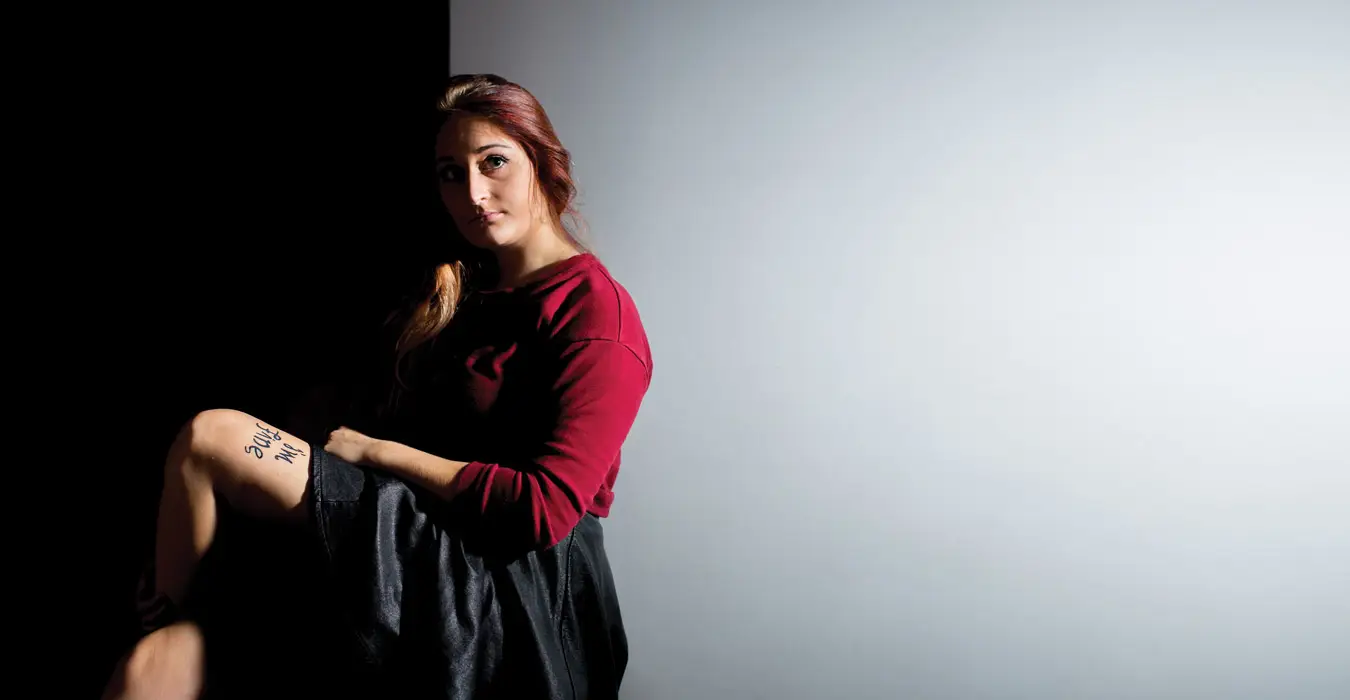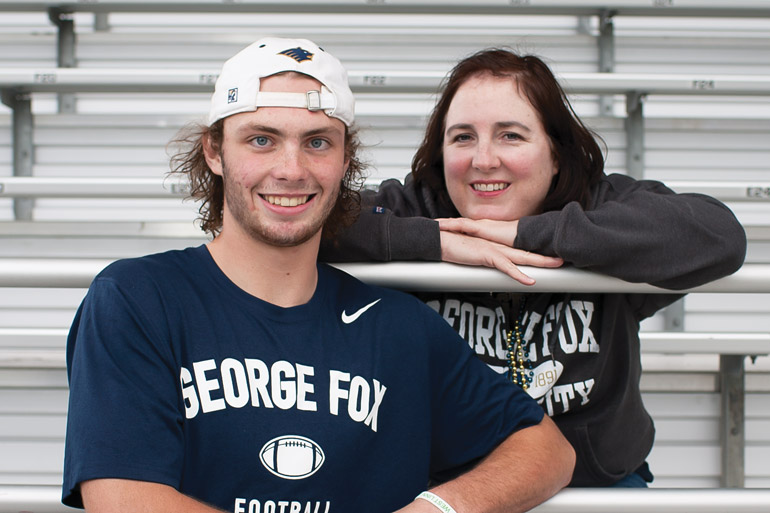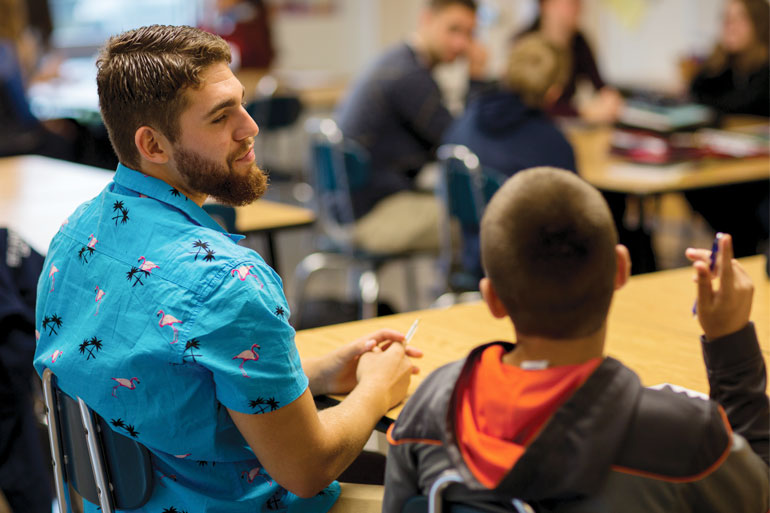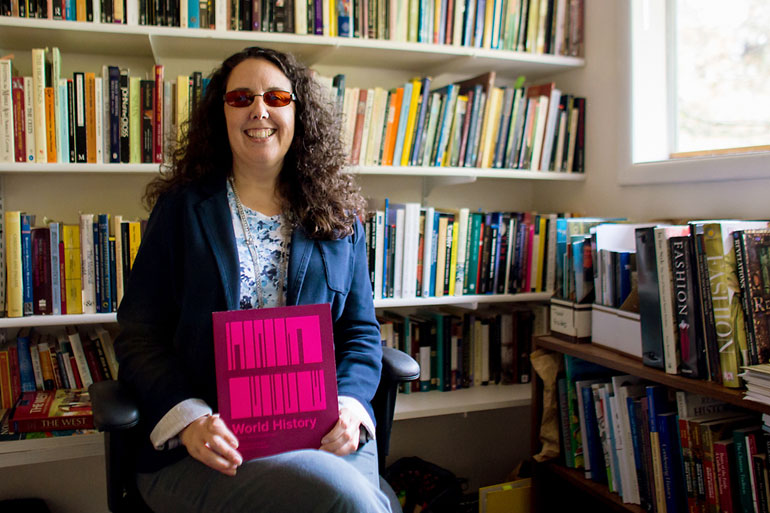
'I'm Fine ... Save Me'
Psychology major Bekah Miles’ bold Facebook post about depression reached millions, raising awareness around the world
By Kimberly Felton
Bekah Miles sat in her chair, staring. Could she do it? Would she do it? No. Yes. She was so tired of hiding, tired of pretending, tired of her illness. But since that wasn’t going to change anytime soon, maybe it was time to change her approach. To take her life back, if she could.
Ten minutes of debate. Then she did what millions do every minute – she clicked the “post” button.
Then she walked away from Facebook, torn between chewing her fingernails down to stubs or shrugging her shoulders and insisting it was no big deal. It’s just Facebook. Just a status update to friends and family.
Just a new tattoo she was announcing.
Just a mental illness she was revealing.
Just an irrevocable step for an intelligent, introverted psychology major at George Fox University who wanted to help others, but discovered she has her own monster to battle – a battle that would gain international attention within days of her online post.
Miles posted two photos with her confession showing the tattoo, still swollen around the edges. Fashioned as an ambigram (displaying different messages from different perspectives), the script inked just above her knee reads “I’m fine” to those looking at Miles. But when she looks at the tattoo from her vantage point, viewing it upside-down, it reads, “Save me.”
(Dear mom and dad, please don’t kill me over this permanent choice. I want you to hear me out.)Today, I am coming out...
Posted by Bekah Miles on Sunday, August 23, 2015
Miles’ Facebook post was only intended for family and friends, but within days it had reached millions, starting a national conversation about depression.
Eight days later, nearly 300,000 people had shared her post on Facebook, reaching millions. Media outlets from the United States and the United Kingdom to Germany and Australia had told her story. Celebrities like Ashton Kutcher and Zooey Deschanel even mentioned it on their own Facebook pages.
Six weeks later the media buzz had quieted, but the number of people sharing her post had climbed to 357,844, with 42,360 comments. More than 42,000 comments – and that did not include the 1,000-plus messages in her Facebook inbox.
Though most comments are positive, lauding Miles for her transparency and courage, she has not read them. “I refuse to,” she says. “There’s a bunch of good ones, but there’s always the one or two negative ones I don’t want to read, so I’m just going to steer clear of all of them.”
Professor’s story builds courage
It’s no easy thing for a psychology major to admit she needs mental help. Though Miles suspects that depression has affected her for several years, she was diagnosed only a year ago. “My best friend got me to go to the counseling center and take my first steps in the right direction,” Miles says. “Even then it was really difficult. Being a psychology major, I knew the tactics. It was really hard for me to get past that.”
Winter break came, and the stress let up for several weeks. “I’ll be OK!” Miles thought. “Then spring semester started, and I just went back down. I didn’t want to go back [to the counselor]. I needed to want to get better.”
That semester – the beginning of her junior year – Miles took a seat in Kristina Kays’ psychology class. The two had limited interaction up to that point, so Miles was just as surprised as her classmates when Kays, a PhD and licensed clinical psychologist, shared her own journey of depression with the class.
“I never would have guessed that about her . . . she’s always so happy, it seems,” Miles says. “I just never would have thought she would have a mental illness like I do. When I saw Kris being so vulnerable in class – such an inspirational person that so many people look up to – I realized it’s OK to talk about this.”
“... it was terrifying in the best way. If by having my personal life exposed it helped so many others, it was worth every minute.”
If a psychology professor wasn’t ashamed of seeking help, perhaps a psychology student could, too. Miles met with Kays outside of class, gaining information and a dose of courage. “She had been through this, so I was asking her about getting medication, which is a pretty scary thing to do – you don’t know the effect it will have,” Miles says.
This past April, in the midst of friendships and classes and homework, Miles began the trial and error of finding the right medication. “Really bad side effects for some of them, like constantly shaking or you can’t sleep,” she says. “It’s terrible in the middle of class; I just can’t keep my body still. It was really rough trying to concentrate.” At the end of April, right before finals, one medication started to work for her rather than against her.
“I was going to go see a counselor starting this summer, but I chickened out again,” Miles says. Instead, she researched graphics about depression that would translate well into a tattoo.
“[Kays] spoke out and it hit me: ‘I want to do that.’ That’s why I got something permanent on my body, so people can ask about it, and so I will talk about it. I’m forced to talk about it. I’m forced to be vulnerable.”
Chaos ensues
School had not started when Miles posted her status update, so she had no need for her computer. She nervously tracked her post on her phone. The 15 shares on Facebook she saw from friends reassured her. She was still loved, still accepted.
Her phone, however, does not show shares outside of friends and friends-of-friends. A few days later her brother called – did she realize what was happening with her post? “I don’t think I’ve ever grabbed and turned on my laptop so fast,” she says. The numbers of shares, likes and comments continued to soar each hour and each day. Her tattoo and status update had struck a chord – a chord few had ever played, because suddenly hundreds of thousands of people around the world were finding their voice in Miles’ words.
A week later a university administrator called: Media outlets were requesting interviews – was she up for it? She gulped. Her original status update claimed, “I am ready to have a conversation about my mental illness.” How ready was she?
Radio and television interviews piled one on top of the other, as other media outlets posted her photos. BuzzFeed, BBC, local news affiliates for Fox and NBC, The Huffington Post, Cosmo, People. Miles always seemed poised, honest, open. “I have no idea how I appeared calm and collected, because I was screaming on the inside,” she says. “I’m a hardcore introvert, so talking about my private life, knowing it was going to be seen and heard by so many people, was terrifying. However, like I said in quite a few of my interviews, it was terrifying in the best way. If by having my personal life exposed it helped so many others, it was worth every minute.”

Kays now meets with Miles on a regular basis after class to offer advice and support. They also discuss the research projects they are working on together focused on the use of social media in driving conversations about difficult topics, using responses to Miles’ Facebook post as qualitative data.
The price and prize of vulnerability
While Miles hopes the unprotected feeling of vulnerability eventually wanes, Kays cautions that this is part of the price they pay to help others.
“I have always felt vulnerable telling my story, and it’s worth it,” Kays says. “If it inspires and frees someone else, then whatever happens is worth the price of being laid open a bit. Where you can’t guarantee the impact of your story, or the outcome of that, I have seen God do amazing things with the little pieces I offer up – of my journey, my story, my struggles. If it brings freedom and hope and the ability to keep that story going, we should be doing this a lot.”
Miles’ vulnerability brought freedom not just to others, but to herself as well. “I’m a lot braver and more courageous than I ever thought I would be able to be,” she says. “I just want to hide, but I’m not going to. I would have considered that I could be a brave and courageous person, but ‘could be’ was the thing. I definitely can say I can and I have been.”
As Miles took those brave steps, she discovered God in the midst of her experience. “For a long time, it was very rocky. I couldn’t handle myself, so I didn’t know how to handle my faith relationship with God. I had pulled back.”
Then homework for Kays’ class, close on the heels of the media blitz, gave her a new perspective.
“It was in A Grace Disguised, by Jerry Sittser, a book about grief and loss I was reading for class,” Miles recalls. “He talks about his own experience: His family got into a car wreck, and he lost his mom, his wife and one of his daughters. He talks about what Paul writes in Romans 8:26-28. . . . He says, basically, in situations sometimes we pull back from God, but he doesn’t take that to heart. It’s OK. He’ll intercede, like a mother embraces her child in her arms.
“That’s how I feel in this situation. He used this experience . . . he interceded in my life and took this, and took off with it, saying, ‘We’re using your struggle to reach so many other people.’ Like, ‘I’m still here, and this is what I’m going to do to show you.’ That was one of the coolest things; it just happened at the perfect time.”
The legacy of a two-week media blitz
No textbook had told Miles that publicly admitting her depression would directly affect – and help – millions. Now she wants people to remember that there are millions just like herself.
“I want people to take away that they’re clearly not alone,” she says. “We talk about our physical health all the time, but we don’t talk about our mental health. We do yearly [physical] check-ups; why don’t we do yearly psychological check-ups? A lot of times, fixing our mental health will fix our physical health. I want people to know it’s OK to talk about, despite the stigma – because the only way it’s going to end is if we keep talking about it, keep fighting it and finding the help we need, and keep sharing our stories.”
For herself, Miles got back into counseling. If she could be brave enough to face the world, she figured, she could be brave enough to face her counselor again.
“I hope I keep doing what I did,” she says. “It’s OK to have something like this and not be afraid of it – not let it define who you are, or let it control who you are. It’s not like I’m fixed, even with counseling and medication. It’s still a daily struggle. So it’s OK when I have bad days, and it’s great when I have good days. Everyone has something wrong. But it’s OK to have these faults. I want to continue to have this conversation.”
Bruin Notes
- University Ranked Among ‘America’s Best Colleges’ for 27th Straight Year
- Professor Brings Computer Coding to Elementary School Classrooms
- Construction Roundup
- University Sets Enrollment Record for 26th Time in 29 Years
- New $180,000 Microscope Used in Cancer, Brain Research
- News Bits
- Women’s Golf Team Honors Fallen Soldier









